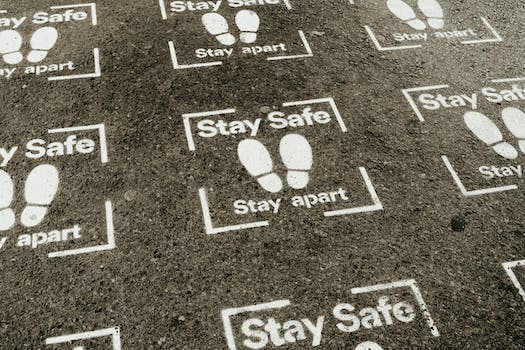It’s getting harder to strike a balance between business and personal life as more and more people opt for a nomadic way of life. Whether you’re a full-fledged digital nomad or only work from home sometimes, it can be challenging to strike a good work-life balance. Fortunately, there are a number of methods that might assist you in striking this balance so that you may live a happy and successful life. This post will discuss five crucial methods for maintaining a healthy work-life balance when on the go.
- 1. Introduction
- 1.1. The importance of work-life balance
- 1.2. The challenges of maintaining work-life balance while living a mobile lifestyle
- 1.3. The purpose of this article
- 2. Strategies for maintaining work-life balance
- 2.1. Establish a routine
- 2.2. Set boundaries
- 2.3. Prioritize your time
- 2.4. Take breaks
- 2.5. Practice self-care
- 3. Establishing a routine
- 3.1. Create a schedule
- 3.2. Stick to a consistent sleep schedule
- 3.3. Schedule time for work and play
- 3.4. Establish a morning routine
- 3.5. Plan your meals
- 4. Setting boundaries
- 4.1. Create a designated workspace
- 4.2. Set limits on work hours
- 4.3. Communicate your availability
- 4.4. Learn to say ‘no’
- 4.5. Limit your screen time
- 5. Prioritizing your time
- 5.1. Identify your top priorities
- 5.2. Learn to delegate
- 5.3. Focus on one task at a time
- 5.4. Use technology to your advantage
- 5.5. Eliminate distractions
- 6. Taking breaks
- 6.1. Schedule regular breaks
- 6.2. Get some fresh air
- 6.3. Practice mindfulness
- 6.4. Engage in physical activity
- 6.5. Take a vacation
- 7. Practicing self-care
- 7.1. Get enough sleep
- 7.2. Eat a healthy diet
- 7.3. Stay hydrated
- 7.4. Manage stress
- 7.5. Engage in hobbies and interests
- 8. Conclusion
1. Introduction
It’s exhilarating and challenging to live a nomadic existence. On the plus side, you can pick and choose where you put in your workday and where you go on vacation. However, balancing professional and personal responsibilities isn’t always easy. In this piece, we’ll go over five methods that are crucial for maintaining a healthy work-life balance when on the go. These guidelines are useful for any mobile worker, whether you’re a freelancer, digital nomad, or distant employee.
1.1. The importance of work-life balance
As a digital nomad, you should always be on the lookout for good rates when booking a place to stay. You may do this in a number of ways, such as by signing up for email newsletters from hotels or hostels in your preferred area, searching travel deals sites like Groupon or LivingSocial, or even contacting the accommodation directly to negotiate a lower fee. You can save money by booking a hotel that is located outside of the city’s main tourist districts. As an added incentive, several lodging establishments provide lower rates for longer stays. As a digital nomad, you may make your hotel dollars go further by employing these methods.
1.2. The challenges of maintaining work-life balance while living a mobile lifestyle
As a digital nomad, one of the greatest methods to discover cheap lodgings is to make use of web tools. You can find hosts who are prepared to rent out their homes or apartments at affordable rates through a variety of websites and applications. Airbnb, HomeAway, and VRBO are just a few of the many options available. You may find and compare a broad variety of lodging options, learn from the experiences of other travelers, and negotiate prices and travel arrangements with hosts all through the same website. Social media groups, such as those on Facebook or LinkedIn, are another great resource for finding like-minded digital nomads and learning about low-cost lodging options throughout the world.
1.3. The purpose of this article
As a digital nomad, one of the most crucial tasks is finding a place to stay that doesn’t break the bank. You should know your budget constraints before beginning your search for a place to stay. You can limit your alternatives and save money in this way. Determine how much of your monthly income is available for housing costs based on your other monthly commitments. It’s important to remember that there are other costs to consider, such as those associated with utilities and the internet.
2. Strategies for maintaining work-life balance
Those who lead a nomadic lifestyle may find it more difficult to strike a work-life balance. To avoid exhaustion, however, it is crucial to develop personal coping mechanisms. Here are five tips for maintaining a healthy work-life balance when on the go:
2.1. Establish a routine
As a digital nomad on a budget, you may want to go beyond the typical hotel or hostel for a place to lay your head at night. House-sitting is a terrific choice because it allows you to remain in a home for free while the owner is away, and it typically also includes the care of the owner’s pets. Couchsurfing is another option; it enables you to stay with a native for free while also gaining valuable cultural insight. Co-living spaces, which provide digital nomads with affordable and communal living arrangements with other like-minded individuals, are also a popular choice.
2.2. Set boundaries
As a digital nomad, you need to be flexible with your dates if you want to find cheap lodgings. Season, day of the week, and even hour of the day can all have an effect on the cost. If you want to save money on your trip, try shifting your dates around by a week or two. Additionally, holidays and other times of high demand for vacation accommodations will likely result in higher overall costs.
2.3. Prioritize your time
As a digital nomad, you can save money on lodging by participating in reward programs. Loyalty programs, which offer discounts, free stays, and other benefits to repeat guests, are becoming common among hotels and booking companies. Don’t miss out on these programs’ sign-up bonuses and other opportunities for savings. You might also use a credit card that gives you rewards points for things like hotel stays. You may stretch your travel budget further and spend less on lodgings by participating in a loyalty program.
2.4. Take breaks
One of the most crucial considerations while looking for cheap lodgings as a digital nomad is the location. The cost of living and lodging in some locations may be notoriously high, but in others, you may find more affordable options. Do some homework to discover out which cities have cheap lodging options like hostels, shared apartments, and short-term rentals before making your final decision. Think about things like the cost of living, accessibility of public transit, and the availability of shared office space. If you are a digital nomad on a tight budget, you can reduce your accommodation costs by picking the right location.
2.5. Practice self-care
It is important to look at the cost of living in a potential location before deciding where to set up your digital nomad business. Housing, transportation, food, and recreation are all part of this category. If you put in the time and effort to investigate your options, you can locate a place to live that won’t put a strain on your finances while still meeting your needs. To obtain a feel for how much money you’ll need in various countries, talk to locals and other digital nomads on forums and social media.
3. Establishing a routine
Establishing a routine is crucial for balancing work and life while living a mobile lifestyle. With constant travel and new environments, it can be easy to lose track of time and let your work take over. By setting up a routine, you can ensure that you have time for both work and personal activities. Here are five essential strategies for establishing a routine:
1. Prioritize your tasks: Make a list of all the tasks you need to accomplish for the day and prioritize them based on their importance. This will help you focus on the most critical tasks and avoid wasting time on less important ones.
2. Schedule your day: Block out specific times for work, exercise, meals, and leisure activities. This will help you stay on track and avoid overworking yourself.
3. Stick to your routine: Once you have established a routine, stick to it as much as possible. This will help you build good habits and make it easier to balance your work and personal life.
4. Be flexible: While it is essential to stick to your routine, it is also important to be flexible. Unexpected events may arise, and you need to be able to adjust your schedule accordingly.
5. Take breaks: It is essential to take breaks throughout the day to recharge your mind and body. Make sure to schedule in short breaks throughout your day to avoid burnout and maintain productivity.
3.1. Create a schedule
Even more so when you’re constantly on the move, sticking to a schedule is essential for keeping your professional and personal life in check. Making a plan might help you stay focused and efficient. Start by establishing and strictly adhering to a regular schedule of work and free time. This will allow you to have some time for yourself, protecting you from burnout and overwork. Be careful to schedule time for relaxation and fun activities like exercise, hobbies, and hanging out with loved ones. Maintaining harmony is a continual quest that calls for adaptability and dedication.
3.2. Stick to a consistent sleep schedule
Having a regular bedtime is especially important for people with nomadic lifestyles who are trying to strike a balance between their professional and personal lives. Without a regular schedule or 9-to-5 job, it’s easy to give in to the temptation of sleeping in or staying up late. But if you sleep at the same time every night, your body clock will adjust and your health will improve. You might think about establishing a regular bedtime and waking hour and sticking to it even on the weekends and holidays. You’ll have more stamina and get more done if you divide your time between work and leisure in this way.
3.3. Schedule time for work and play
It is extremely important for those leading nomadic lifestyles to establish routines that allow them to maintain a healthy work-life balance. Planning in time for both work and recreation is a crucial part of this schedule. This includes scheduling time for both work and personal pursuits, such as hobbies and relaxation. This way, people can create order and balance in their everyday lives while making sure they’re not ignoring either component.
3.4. Establish a morning routine
Having a consistent morning routine is essential for staying on track even when you’re constantly on the go. You can start each day off on the right foot and keep your attention on your objectives if you establish a pattern. Key components of an effective morning routine include:
1. Get up before the sun rises. This will allow you to get more done and keep your energy levels up all day long.
You can increase your energy and concentration by working out first thing in the morning.
Third, breakfast is the most important meal of the day, so make sure it’s a good one.
Take some time to meditate each day to help you maintain your equilibrium and perspective.
Five, schedule your day so that you may stay focused and productive throughout the day.
3.5. Plan your meals
As a digital nomad, you should think about things like location and amenities when searching for cheap places to stay. The convenience of surrounding amenities, public transportation, and general safety all hinge on the location. There is a significant correlation between the quality of life and the availability of amenities like free Wi-Fi, laundry rooms, and shared offices. If you do your homework, you should be able to locate something that works for your needs and your budget.
4. Setting boundaries
It’s exhilarating and challenging to live a nomadic existence. When you have the option to accomplish your job from any location, it might be challenging to maintain a healthy work-life balance. That’s why it’s crucial to establish limits if you want to strike a good work-life balance. Here are five ways to establish limits and maintain equilibrium when on the go:
4.1. Create a designated workspace
Having a set place to work is essential for balancing business and personal life when traveling frequently. Having a designated workspace, be it a nook in your RV or a desk at a shared office, can help you get more done. Make sure you have a good chair to sit on, some good lighting, and a stable internet connection in your workspace. Having a dedicated workspace makes it much simpler to separate work and leisure time, allowing for a more seamless transition from one to the other.
4.2. Set limits on work hours
As a digital nomad, searching for offers and discounts is a great way to save money on lodging. When you book in advance or stay for an extended period, you may often save money at hotels, hostels, and vacation rentals. Booking.com, Expedia, and Airbnb are just some of the websites and apps you can use to locate great hotel deals and discounts. Joining a loyalty program or making advantage of credit card benefits might also help you save money on lodging. Using these methods, a digital nomad can locate pleasant and reasonably priced lodgings wherever their work takes them.
4.3. Communicate your availability
Get on the mailing lists of major travel sites, airlines, and hotel chains to receive updates on discounts and special offers. As a result, you may spend less on lodging and other trip costs. Keep an eye on your inbox since you never know when an offer you’re interested in might pop up.
4.4. Learn to say ‘no’
As a digital nomad, one of the greatest ways to save money on lodging is to take advantage of discount codes and special deals. You can save a lot of money by taking advantage of the specials and discounts offered by many hotels, hostels, and companies that let you rent out vacation homes. Look for discount codes and special offers online before making your reservation. Google searches and signing up for the hotel’s email listserve usually turn up such deals. You may save a lot of money on hotel costs by looking for deals on sites like Groupon and LivingSocial.
4.5. Limit your screen time
As a digital nomad, you can save money on lodging by taking advantage of group pricing. Consider getting numerous hotel rooms or a larger rental property to accommodate your entire company and save money. Be sure to inquire about any group discounts that may be available when making your reservations.
5. Prioritizing your time
Living on the go might make it difficult to distinguish between work and leisure time. Managing your time well requires setting priorities. One tactic is to divide one’s time clearly between work and leisure. Setting and maintaining regular work hours and a dedicated workspace are two examples. One method is to arrange work in order of priority or urgency. This will help you prioritize your work and do the most important things first, saving you time and stress. Taking care of yourself and giving yourself time to rest and recharge is another great way to avoid burnout. Sharing your requirements and setting limits with those around you is essential, whether you’re dealing with coworkers, customers, or loved ones. When you know what you value most, you can devote your time and energy to it.
5.1. Identify your top priorities
In order to successfully juggle business and personal commitments while on the go, it is essential to establish what matters most to you. Consider your life’s priorities and the professional and personal goals you’d like to accomplish. You’ll be better able to decide how to spend your time and effort as a result of this. It may also require you to make some tough decisions and decline some opportunities, but keep in mind that doing so will free up space for what really matters in your life.
5.2. Learn to delegate
If you want to maintain a healthy work-life balance while traveling, learning to delegate is a crucial skill to acquire. The ability to delegate duties to competent coworkers or outside experts frees you up to concentrate on those that require your unique set of skills and knowledge. The key to efficient delegating is learning to prioritize your time. Figure out which activities are absolutely necessary, and which ones you can delegate. Create a group of reliable people that can carry out assigned responsibilities with little oversight from you. Communicate your timeframes and desired output quality clearly and in detail. By knowing how to delegate tasks, you can save time and effort for what really matters, whether that’s expanding your business or taking more time off.
5.3. Focus on one task at a time
Focusing on one thing at a time is essential while trying to juggle professional and personal obligations while on the go. Focusing on the most important things requires setting goals and sticking to them. Although it may appear advantageous to perform multiple tasks at once, doing so might actually reduce efficiency and increase anxiety. By concentrating on only one thing at a time, you can get it done faster and better. This will provide you the mental space to go on to the next project with confidence.
5.4. Use technology to your advantage
In today’s fast-paced world, it can be difficult to maintain a healthy work-life balance, especially if you have a nomadic way of life. However, advancements in technology have made it simpler than ever to set priorities and strike a healthier work-life balance. You can maintain your connections with others, maintain your order and productivity, and work from anywhere thanks to technological advancements. Here are five tips for maintaining a healthy work-life balance when on the go:
5.5. Eliminate distractions
In order to prioritize tasks and maintain a healthy work-life balance when on the go, it is essential to minimize interruptions. One way to reduce distractions is to turn off notifications on your phone and computer, work in a quiet area, or use noise-cancelling headphones. You can maximize your time and get more done in less time if you eliminate any potential distractions.
6. Taking breaks
Taking pauses is a crucial part of maintaining a healthy work-life balance when you’re constantly on the move. When you have the freedom to work from anywhere, it’s easy to neglect taking time for yourself in favor of getting more done. Taking a break can help you recharge and refocus, whether it’s a long walk, a yoga session, or just a few minutes away from your computer. Taking regular breaks has been shown to reduce the risk of burnout and boost performance. Make time for yourself and prioritize self-care by building frequent pauses into your daily routine.
6.1. Schedule regular breaks
Planning frequent breaks is crucial for maintaining a healthy work-life balance when you’re constantly on the move. Taking short breaks during the day has been shown to have positive effects on productivity, stress, and well-being. Taking frequent breaks, whether for a stroll, a yoga session, or just some quiet time, can have a significant impact on your mood and productivity.
6.2. Get some fresh air
Those who lead more nomadic lifestyles, in particular, should make a point of taking frequent breaks to get outside and recharge their batteries. It’s easy to get so absorbed in your work that you forget to stop for a moment and relax. However, taking a break and coming back to your work with a new perspective might boost your productivity and creativity. If you’re finding it hard to strike a balance between work and life, go for a walk, soak up some rays, and appreciate nature.
6.3. Practice mindfulness
Taking regular breaks is an important part of balancing your professional and personal life. Mindfulness training is a great tool for accomplishing this. Being mindful means giving one’s undivided attention to whatever is happening right now. Recharging your mind and spirit can be as simple as turning off all electronic devices and focusing on your breathing or your immediate environment. This can make you feel refreshed and ready to get back to work. Make time every day for a focused activity like meditation or deep breathing exercises. How much of an impact it has on your health is something you might find surprising.
6.4. Engage in physical activity
Working out regularly is a crucial tactic for managing a nomadic career and personal life. Getting up and moving around every once in a while is a great way to relieve stress and keep you on task. Getting some exercise, whether it’s walking, going to the gym, or doing yoga, can give you a mental and physical boost. If you make time to exercise on a regular basis, you’ll find that you’re better able to focus on both your work and your free time.
6.5. Take a vacation
Taking regular breaks is crucial to keeping a healthy work-life balance when you’re constantly on the go. With the flexibility to work from anywhere, it’s tempting to neglect taking breaks to replenish your batteries. Taking breaks, whether they are small breaks throughout the day or extended vacations, can help you maintain productivity and prevent burnout.
7. Practicing self-care
Self-care is crucial when you’re constantly on the go and attempting to maintain a work-life balance. It’s easy to forget about yourself in the midst of your busy schedule, but making time for relaxation is essential. This may involve doing anything as simple as taking a deep breath or as elaborate as meditating. You’ll be better able to handle the stresses of work and life if you make self-care a top priority.
7.1. Get enough sleep
Getting enough shut-eye is especially important for nomadic workers who strive to strike a healthy balance between their professional and personal lives. Not getting enough sleep can negatively impact your health, mood, and ability to get things done. Get on a regular sleep schedule and try to keep to it so you can be sure you’re getting enough shut-eye. Do not use electronic gadgets in the hour before bedtime, as the blue light they emit can throw off your body’s internal clock. In addition, make an effort to establish a soothing pre-sleep ritual to assist unwind your body and mind. You can better manage the pressures of a nomadic lifestyle and strike a good work-life balance if you get enough shut-eye each night.
7.2. Eat a healthy diet
Self-care involves many different practices, one of the most crucial being a balanced diet, especially for the nomadic. Fast food and other processed snacks can be convenient while you’re on the run. Whole, nutrient-dense foods, however, can be a source of sustained energy and general health if one makes an effort to include them in one’s diet. Preparing meals and snacks ahead of time, selecting restaurants with healthy alternatives, and choosing whole foods over processed or packaged goods are all ways to maintain a healthy diet when traveling. Eating well is important for your mental and emotional well-being as well as your physical health.
7.3. Stay hydrated
In order to keep up a healthy and productive lifestyle when on the go, it is essential to drink plenty of water. The negative effects of dehydration on one’s job and personal life, such as headaches, weariness, and impaired cognitive function, are well-documented. Always have some water on hand, and sip steadily throughout the day. In addition, eat plenty of fruits and vegetables, which contain a lot of water. Maintaining a healthy level of hydration might help you feel better and cope better with the stresses of your hectic schedule.
7.4. Manage stress
Taking care of oneself is essential for dealing with the stresses of a nomadic lifestyle. Taking care of oneself means doing things like setting aside time for rest and recreation, eating right, getting enough shut-eye, and limiting stress wherever possible. It’s crucial to put self-care first and include it into your daily plan. Taking care of yourself will make it easier for you to deal with the pressures of work and daily life.
7.5. Engage in hobbies and interests
Self-care is taking time for activities that you enjoy doing. It’s easy to get caught up in work when you’re constantly on the move, and it’s even easier to neglect the things that bring you joy and relaxation. Dedicating time to pursuits outside of work has been shown to have positive effects on health and well-being in numerous ways. Find something you enjoy doing and make it a priority in your life, whether it’s painting, playing an instrument, going on hikes, or anything else.
8. Conclusion
In conclusion, maintaining a healthy work-life balance while always on the move is difficult, but not impossible. You can create a fulfilling and sustainable lifestyle that allows you to thrive in both your professional and personal spheres by implementing the five essential strategies outlined in this article: setting priorities, establishing boundaries, staying organized, taking breaks, and practicing self-care. Maintaining equilibrium requires time and effort, so be kind to yourself as you strive toward your goals. You can get the perfect work-life balance even if you’re constantly on the go if you put in the time and effort.
8.1. Recap of strategies for maintaining work-life balance
In conclusion, maintaining a healthy work-life balance when always on the move is difficult but not impossible. Setting priorities and making a plan that works for you are the keys. Take care to recharge your batteries, maintain order, and keep lines of communication open with those around you. This article outlines five key tactics for striking a healthy work-life balance and reaping the benefits of a nomadic existence without letting either one suffer.
8.2. The benefits of work-life balance
In conclusion, it is crucial for nomadic individuals to strike a balance between their professional and personal lives. It’s beneficial for your health and productivity in general, and it helps minimize stress and burnout. Successfully juggling professional and personal commitments while maintaining a nomadic lifestyle is possible with the help of the methods presented in this article. In order to strike a happy medium, it’s crucial to put your own needs first and establish firm limits.
8.3. Encouragement to prioritize work-life balance while living a mobile lifestyle
Maintaining a healthy work-life balance is critical for anybody, but especially so for those who are constantly on the move. It’s tempting to let work consume your life to the exclusion of everything else, but remember that self-care and nurturing your relationships are equally as crucial as your professional success. It is possible to maintain a healthy work-life balance when traveling as long as we establish clear boundaries, make time for ourselves and our loved ones, and keep our priorities in order.
Conclusion
Prioritizing self-care, setting boundaries, being organized, communicating effectively, and being flexible are all essential for maintaining a work-life balance when on the go. By following these five guidelines, anyone can enjoy the benefits of a nomadic lifestyle while also meeting the obstacles of maintaining a healthy work-life balance.





